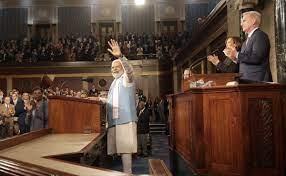WASHINGTON, June 24: Prime Minister Narendra Modi’s visit to the US was not about leveraging India to be a “counterweight” to China but to deepen ties, including defence cooperation, between the largest democracies of the world, a top White House official has said.
Prime Minister Modi on Saturday left for Egypt after concluding his state visit during which he held wide-ranging talks with President Joe Biden and addressed the joint session of the US Congress.
He visited the US at the invitation of President Biden and First Lady Jill Biden.
“This state visit wasn’t about China. Look, India has challenges with China as well, right on their doorstep, but also more broadly in the region. And, clearly, the challenges presented by the People’s Republic of China to both our nations were on the agenda yesterday, no question about that,” said John Kirby, Coordinator for Strategic Communications at the National Security Council in the White House.
“But this wasn’t about leveraging India to be some sort of counterweight. India is a sovereign independent state. They have their own foreign policy that they have to manage. And they live in a tough neighbourhood,” he told reporters at a news conference here on Friday.
Kirby said India is becoming an increasing exporter of security, which the US welcomes.
“You can see a lot of that – our desire to improve the defence cooperation on hand yesterday in some of the deliverables, whether it’s the co-production of jet engines, whether it’s their purchase of MQ-9 drones. There is a lot we can do in the security front together, and that’s really what we’re focused on,” Kirby said in response to questions.
He said Modi’s visit was about sending a message to the American and Indian people about how important this bilateral relationship is to people around the world.
“India has challenges with China on their own. And they address those challenges largely on their own,” he said.
“I will add that they are a member of the Indo-Pacific Quad and have been a terrific contributor through that multilateral forum. It’s not a formal alliance. It’s not a military organisation. They have legitimate concerns in the Indo-Pacific that they’re addressing through their own vehicles as appropriate,” Kirby said.
In his address to the joint meeting of the US Congress for a second time on Thursday, Modi said the “dark clouds of coercion and confrontation” are casting their shadow on the Indo-Pacific, in a veiled attack on China amid its aggressive military manoeuvring in the strategically vital region.
“The dark clouds of coercion and confrontation are casting their shadow in the Indo-Pacific. The stability of the region has become one of the central concerns of our partnership,” he said in the backdrop of the prolonged stand-off between the armies of India and China in eastern Ladakh.
The prime minister talked about a region where all nations, small and large, are free and fearless in their choices, progress is not suffocated by an impossible burden of debt, connectivity is not leveraged for strategic purposes, and where all nations are lifted by the high tide of shared prosperity.
His comments came amidst the economic crisis in countries such as Sri Lanka and Pakistan, where China has made huge unviable infrastructure investments. The two South Asian countries are currently facing an unprecedented economic crisis.
“We share a vision of a free, open and inclusive Indo-Pacific, connected by secure seas, defined by international law, free from domination, and anchored in ASEAN centrality,” Modi said.
“Our vision does not seek to contain or exclude, but to build a cooperative region of peace and prosperity. We work through regional institutions and with our partners from within the region and beyond. Of this, QUAD has emerged as a major force of good for the region,” he said.
India, the US and several other world powers have been talking about the need to ensure a free, open and thriving Indo-Pacific in the backdrop of China’s rising military manoeuvring in the region.
China claims nearly all of the disputed South China Sea, through which more than USD 5 trillion of trade passes annually. The Philippines, Vietnam, Malaysia, Brunei and Taiwan have counterclaims over some of the areas claimed by China.
Beijing has built artificial islands and military installations in the South China Sea.
Kirby also said President Biden is satisfied that he had the opportunity to discuss concerns over human rights in India with Prime Minister Modi.
“And in the end, he did, as he always does. We don’t shy away from discussing human rights with foreign leaders. And one of the reasons you have partnerships and friendships is so that you can be honest and direct. But I think he addressed that pretty well in his answer to you guys,” he said. (PTI)


